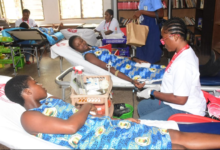Birth and Death Registry staff move to local govt

All staff under the Birth and Death Registry have been integrated from the Civil Service to the local government, to facilitate the decentralisation and proper account of birth and death across the country.
This follows the passage of a New Act, 2020(1027) which replaced the registration of Birth and Death Act 1965(Act 301) that provide for the decentralisation of the Registry.
To this end, the Ministry of Local Government, Decentralisation and Rural Development (LGDRD) has assigned responsibility for the registration of Birth and Death to Metropolitan, Municipal and District Assemblies (MMDAs).
Based on the foregoing, MMDAs in consultation with the Registrar of Birth and Death, are required to appoint District Registrars and Registration Officers for the District offices of the Birth and Death Registry.
The Minister of LGDRD , Mr Daniel Botwe who made this known yesterday in Accra, at a ceremony to officially integrate all staff of the Registry said a number of activities had been undertaken to facilitate the decentralisation of the Registry.
He said the Births and Deaths Registry had responsibility for the registration of all births and deaths in the country, to contribute to the generation of vital statistics for decision making.
Mr Botwe said in the course of its work, the Registry also defines standards and quality control procedures for the collection and use of the records and information collected through the registration system and guarantees the privacy and security of these records.
“Population data is critical for planning purposes. It is a key determining factor in the designing of development interventions across the length and breadth of the country.
It is, therefore, important to devolve the registration of births and deaths to facilitate the efficient registration of all births and deaths to enable us plan effectively for the development of our country,” he said.
He said the effective work of the Registry would augment the work of the National Identification Authority and by extension the Ghana Statistical Service.
The Head of Local Government Service, Dr Nana Ato Arthur, said information on birth and death were the cornerstone of public health planning, stressing that the integration of staff were laudable and long overdue
He said this would spearhead the decentralisation process in a manner where government was brought to the doorstep of the ordinary citizen through participation, better planning and improved service delivery across all MMDAs.
“When birth and death go uncounted and the causes of the death are not documented, government cannot design effective public health policies or measures their impact.
Civil registration records of birth and death are obligatory to collate accurate, complete and timely statistics, which along with population size especially for small areas,” he said.
BY BERNARD BENGHAN






